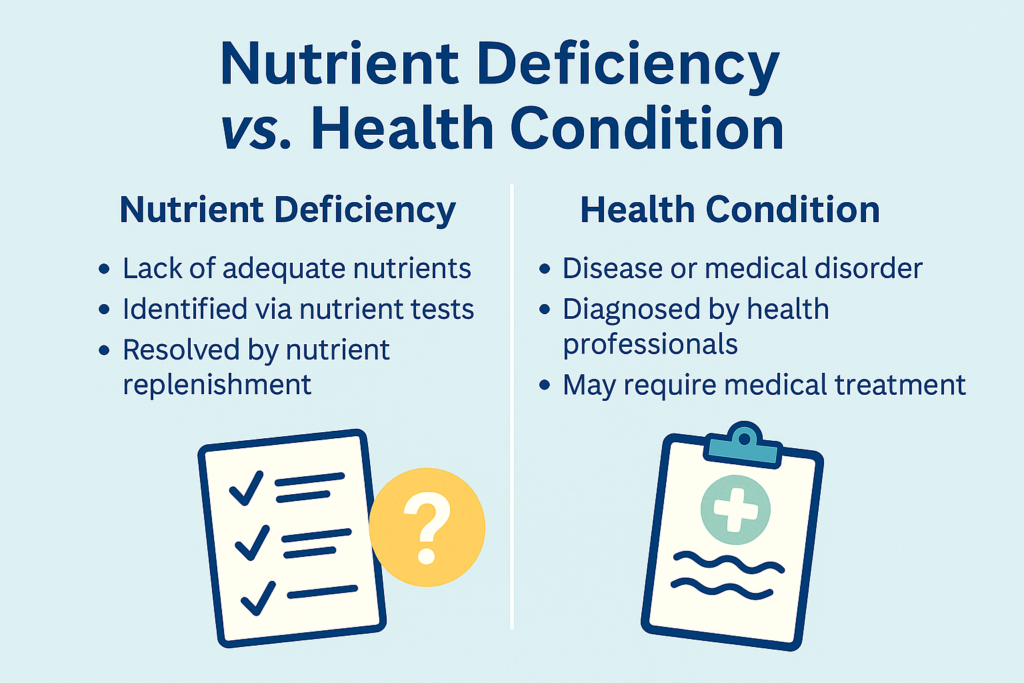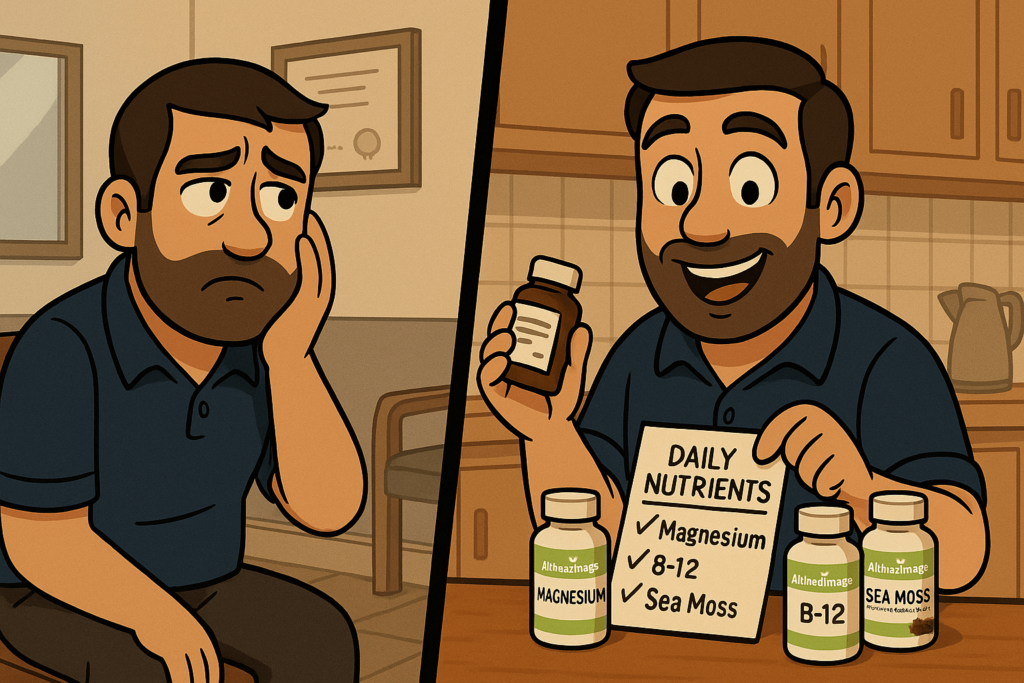What’s the Difference Between a Nutrient Deficiency and a Health Condition?
⚠️ When in Doubt, See Your Doctor
Not every symptom is nutritional.
If you’re experiencing sudden fatigue, dizziness, pain, numbness, or neurological changes — always consult a licensed doctor first.
This article isn’t medical advice — it’s personal experience and helpful insight into the difference between needing support vs needing a diagnosis.
Let’s Break It Down
I remember feeling completely worn out — brain fog, cramping, restless sleep, and zero motivation. I thought maybe I was just aging badly or something was “off” in my brain.
But it wasn’t a condition. It was a nutrient deficiency.
What Is a Nutrient Deficiency, Really?
A nutrient deficiency means your body is low on something it needs — like magnesium, B12, vitamin D, iron, or omega-3s.
And because your body is smart, it will start “whispering” symptoms before shouting.
Those whispers? Most people ignore them.

What Does a Nutrient Deficiency Look Like?
These symptoms are often brushed off — or misdiagnosed:
- Low energy or burnout
- Restless sleep or trouble staying asleep
- Muscle cramps, twitching, or tightness
- Brain fog, forgetfulness, or slow thinking
- Mood shifts, anxiety, or irritability
- Digestive changes (bloating, constipation)
- Hair loss, brittle nails, or dry skin
- Burning feet or light sensitivity
- Cold hands and feet
🧠 Common nutrient gaps in the U.S. include magnesium, B12, vitamin D, and iron (source: NIH).
Nutrient Deficiency vs Health Condition
Here’s a visual breakdown to help separate the two:
| Health Condition | Nutrient Deficiency |
|---|---|
| Formal diagnosis (may involve scans) | Often missed unless tested specifically |
| May need long-term medication | Often improves with food + supplement care |
| Worsens without treatment | May resolve with nutritional support |
| Symptoms can be constant or severe | Symptoms are often mild, vague, or cyclical |
| Source may be genetic or disease-based | Usually driven by food, stress, or habits |
📝 Pro tip: You can have both — but it’s worth checking for deficiencies before assuming the worst.
My Story: From Fog to Fuel
I used to think I had adrenal fatigue or some mystery illness. I’d wake up groggy, hit a 2pm wall, and toss all night long.
I cleaned up my food, started supplementing smart (magnesium glycinate, B12 drops, beetroot, sea moss) — and slowly, my body woke up again.
Not overnight. But day by day, I felt like me again.
How to Tell If It’s a Deficiency
Ask yourself:
- Did this develop slowly?
- Do symptoms worsen when I eat poorly or sleep less?
- Do I feel better when I clean up my routine?
- Have I had micronutrient testing, not just basic labs?
💡 Bloodwork Tip:
Serum tests measure what’s in your blood right now.
Intracellular tests show what’s actually inside your cells — often a better indicator of what your body can access and use.
🧪 Ask your doctor or functional provider about full-spectrum nutrient panels.
🔗 NIH Magnesium Fact Sheet →
🔗 Mayo Clinic B12 Deficiency Symptoms →
Important: Don’t Supplement Blindly
Just because something is natural doesn’t mean “more is better.”
⚠️ High doses of certain nutrients — like vitamin A, iron, or zinc — can be harmful.
Start low, go slow, and work with your practitioner if you’re on meds or managing a condition.
Don’t Forget the Macros
Most people overfocus on vitamins and minerals — and overlook the big rocks:
- Protein builds and repairs everything.
- Fat fuels hormones and brain clarity.
- Carbs (if used) can power workouts and recovery.
💥 You can’t supplement your way out of a low-protein, low-fat diet.
What Helped Me Feel Better
When I feel off, I check 3 things:
- Am I eating clean — real food, not just snack bars?
- Am I taking my core stack (magnesium, B12, etc.)?
- Am I sleeping, moving, and hydrating?
That checklist saves me every time.
Product Spotlight: What I Take Now
Magnesium Glycinate – 275mg
Supports sleep, muscle recovery, stress balance
B-12 Plus Liquid Drops
Helps promote focus, energy, nervous system health
Sea Moss Complex
Natural source of iodine, iron, and 90+ minerals
These aren’t “magic.” They’re part of my support system — and they help me stay in rhythm when life gets chaotic.
FAQs
Q: How can I tell if this is a real health issue or just a deficiency?
Start tracking symptoms + cleaning up food. If nothing improves, get lab work and talk to your doctor.
Q: Can supplements reverse symptoms?
They can help — especially if you’re addressing an actual gap. But no supplement replaces real food, sleep, or hydration.
Q: How fast do supplements work?
Some people feel better in a few days. Others need consistency for 4–6 weeks. Stick with it.
Q: What are signs of macronutrient imbalance?
Low protein = poor recovery and cravings.
Low fat = brain fog and hormone issues.
Too many carbs = blood sugar crashes and fatigue.
Q: Do you recommend any resources?
NIH Office of Dietary Supplements has free fact sheets:
ods.od.nih.gov/factsheets/list-all
Want My Exact Routine?
📥 Grab My Supplement Routine Cheat Sheet —
the real plan I use daily for better energy, sleep, and mental clarity.
👉 [Download It Here →]
Final Thoughts
Not every symptom is a sentence. Sometimes it’s a signal.
Before you assume something is “wrong,” ask:
Am I supporting myself well enough to feel right?
Start with food. Add in smart support. And listen closely — your body’s been trying to tell you something.
If this helped you, share it with someone who needs it — or shoot me a message and let’s talk!

